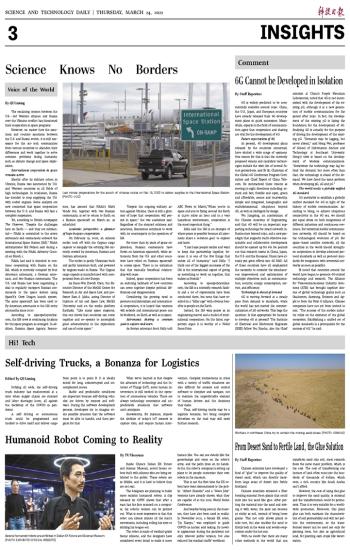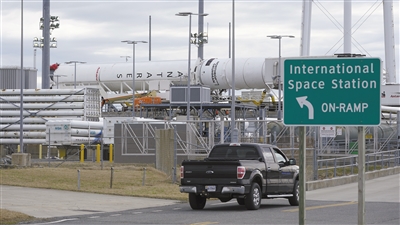
 |
| Last minute preparations for the launch of Antares rocket on Feb. 18, 2022 to deliver supplies to the International Space Station. (PHOTO: VCG) |
The escalating tension between the U.S. -led Western alliance and Russia over the Ukraine conflict has threatened their cooperation in space programs.
However, no matter how the sanctions and counter-sanctions between the U.S. and Russia evolve, it is still necessary for the sci-tech communities from various countries to abandon their differences and work together to solve common problems facing humanity, such as climate change and space exploration.
International cooperation in space remains active
Shortly after its military action in Ukraine, Russia was sanctioned by U.S. and Western countries in all fields of high technologies. In retaliation, Russia has decided to stop supplying the U.S. with rocket engines. Some analysts are now concerned that space cooperation between the U. S. and Russia will face a complete suspension.
Yet, according to British newspaper The Observer, "Despite the challenges here on Earth — and they are substantial— NASA is committed to the seven astronauts and cosmonauts onboard the International Space Station (ISS)," NASA Administrator Bill Nelson said during a meeting with the NASA Advisory Council on March 1.
NASA had said it intended to continue cooperating with Russia on the ISS, which is currently occupied by four American astronauts, a German astronaut, and two Russian cosmonauts. The U.S. and Russia had been negotiating a deal to regularly transport Russian cosmonauts to the space station using SpaceX's Crew Dragon launch system. The same spacecraft has been used to fly American astronauts to the ISS every six months since 2020.
According to spacepolicyonline.com, the ISS crew is continuing its plans for the space program as arranged. In addition, Russian Space Agency, Roscosmos, has assured that NASA's Mark Vande Hei, together with two Russian cosmonauts, is set to return to Earth on a Russian spacecraft on March 30, as scheduled.
Academic perspective: a glimmer of hope in space cooperation
On February 19, 2022, an Antares rocket took off with the Cygnus cargo capsule to resupply the orbiting ISS currently crewed by American, Russian and German astronauts.
The rocket is partly Ukrainian-built and partly American-built, and powered by engines made in Russia. The Cygnus cargo capsule is manufactured with components from all over Europe.
As Kuan-Wei (David) Chen, the Executive Director of the McGill Centre for Research in Air and Space Law, and professor Ram S. Jakhu, acting Director of Institute of Air and Space Law, McGill University said on the media platform Earthsky, "Like many space missions, this one shows that countries can come together and co-operate to accomplish great advancements in the exploration and use of outer space."
"Despite the ongoing military action against Ukraine, there is still a glimmer of hope that cooperation will persist in space," the two academics said. Regardless of the strained relations and sanctions, Roscosmos continues to work with its counterparts in the operation of ISS.
For more than 65 years of space exploration, Russian cosmonauts have flown on American spacecraft, while astronauts from the U.S. and other countries have relied on Russian spacecraft to access space. There is no indication that this mutually beneficial relationship will cease.
Indeed, space cooperation has been an enduring hallmark of how countries can come together despite political differences and disagreements.
Considering the growing need to promote multilateralism and international cooperation, it is hoped that tensions will subside and international peace can be brokered, on Earth as well as in space.
Astronauts: sharing a common goal to explore and learn
As former astronaut Scott Kelly told ABC News in March,"When you're in space and you're flying around the Earth at 17,500 miles an hour and in a very hazardous environment, cooperation is the most important thing."
Kelly said the ISS is an example of where peace is possible because all astronauts share a common goal: to explore and learn.
"I just hope people realize and want to keep this partnership together, because it is one of the few things that unites all of humanity," said Kelly. "I think one of the biggest successes of the ISS is the international aspect of giving us something to work on together, that makes us friends."
According to spacepolicyonline.com, the ISS is a scientific research facility and a lot of experiments have been conducted there, but none that have resulted in a "killer app" with obvious benefits to people on the Earth.
Instead, the ISS wins praise as an engineering marvel and a model of international cooperation. On the latter, supporters argue it is worthy of a Nobel Peace Prize.


 Next
Next




